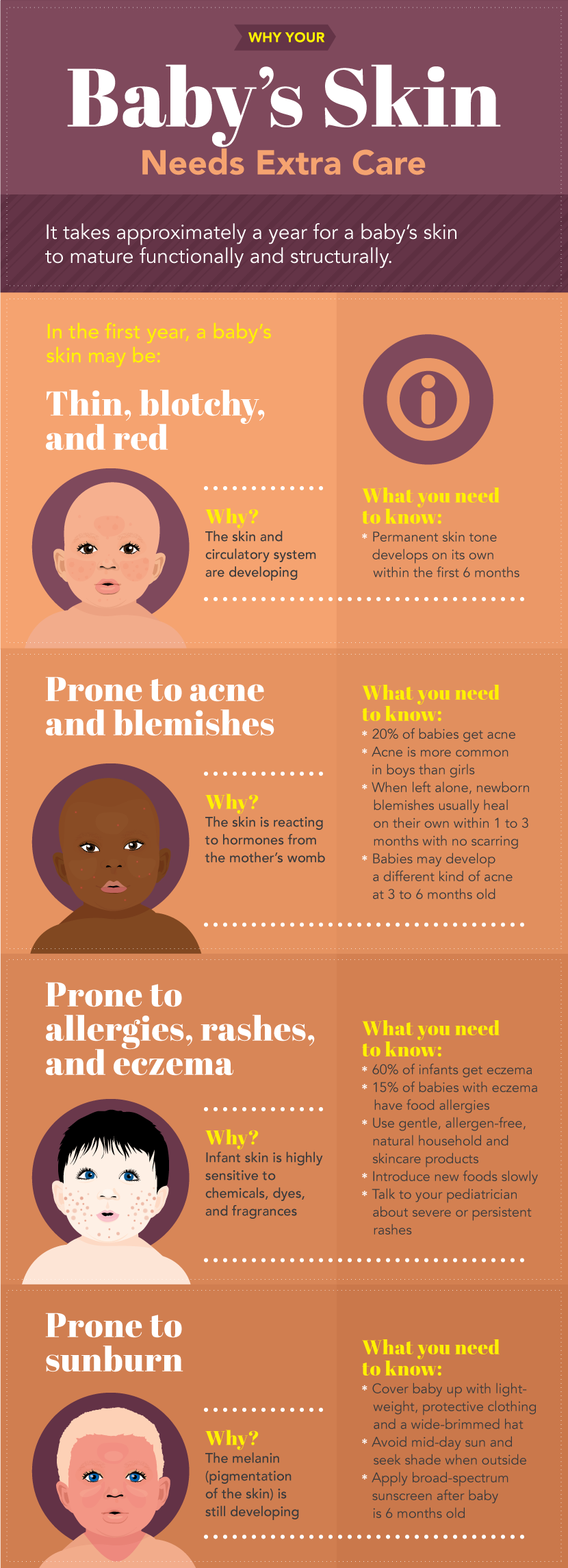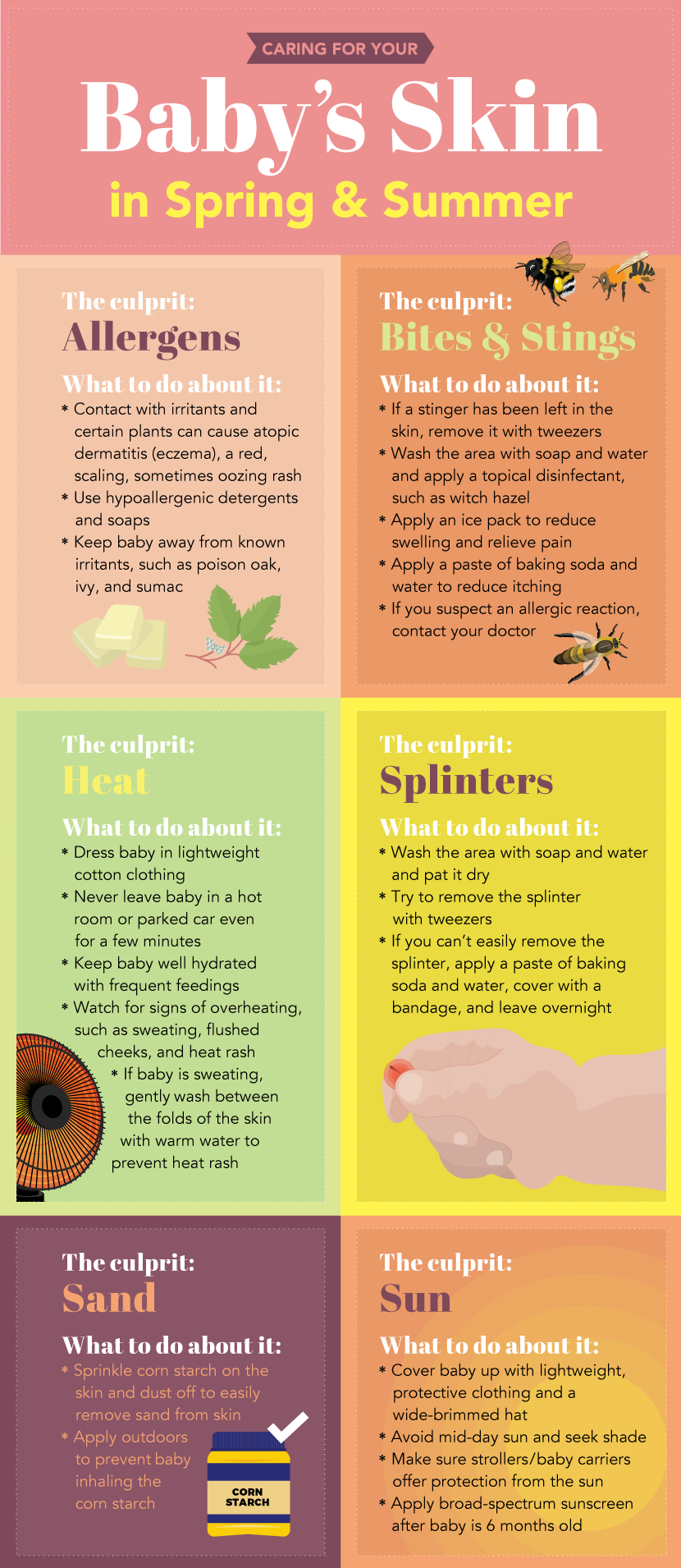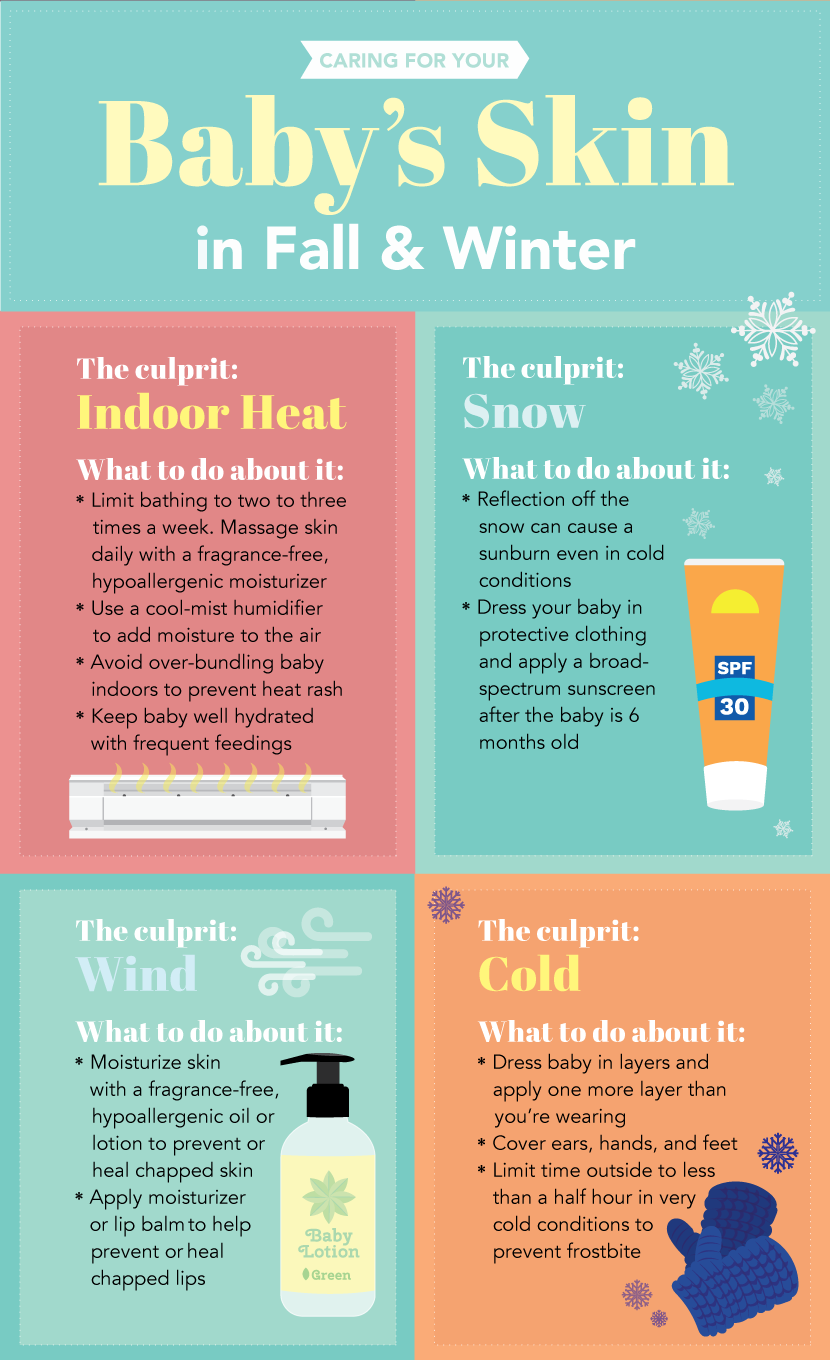Seasonal Skincare for Your Baby
Baby skin is synonymous with silky, supple, and smooth, right? Well, not necessarily. A newborn’s skin is still functionally and structurally developing during the first year, and it may be red and blotchy, dry, and prone to rashes and acne. You need to take special care to protect your baby’s delicate skin from potential allergens and irritants as well as the elements. Read on for a survival guide for caring for your baby’s skin in spring, summer, fall, and winter.

The Characteristics of Infant Skin
Your baby’s skin may look like yours, but it’s different in some key ways. Infant skin is thinner and more fragile. The barrier that keeps fluids inside the body and toxins out is still developing and can be damaged easily, especially in the first four weeks of a baby’s life.
Infants have more skin per volume than adults and less subcutaneous fat, the fat just beneath the skin. Their skin has higher water content and loses excess water faster than adult skin. Because of these differences, it’s important to treat your baby’s skin with special care and only apply essential products to the skin in the first several months.http://www.medscape.org/viewarticle/743529
Routine Infant Skin Care
Even before they can crawl, babies manage to come into contact with dirt, saliva, nasal secretions, urine, feces, and microbes. All the above can lead to discomfort, irritation, and infection if they linger on the skin. Baths are an important way to clean your baby and they can be a special time for bonding and connecting.http://health.usnews.com/health-news/health-wellness/articles/2015/02/18/the-benefits-of-bath-time-for-babies But don’t go overboard scrubbing your baby, or you risk damaging or drying out their fragile skin. Bathe your baby a few times a week in a warm room with warm water and a gentle cleanser. Keep baths short, and be extremely gentle with the skin during the first few months to prevent damage to the skin barrier.http://www.medscape.org/viewarticle/743529
After the bath, apply a moisturizer if baby’s skin is dry. Moisturizer improves the condition and function of the skin barrier in premature infants, as well as in adults.https://www.hindawi.com/journals/drp/2012/198789/ For preemies, it can even be a lifesaver. Applying sunflower seed oil three times a day has been shown to reduce sepsis in preemies by 41% and reduce mortality by 26%.http://www.medscape.org/viewarticle/743529 Coconut oil may be a good choice for an infant moisturizer. It was used as a traditional moisturizer in the tropics and, according to one study, it significantly improves hydration and lipid levels in the skin of infants. Spot test first to make sure your baby doesn’t have a rare allergy to the oil that you choose.https://www.ncbi.nlm.nih.gov/pubmed/15724344
Massaging oil on your baby confers benefits beyond skin health. Skin-to-skin contact is crucial for infants.https://www.scientificamerican.com/article/infant-touch/ Preterm babies who receive touch and stimulation daily gain weight faster and are more active.https://www.ncbi.nlm.nih.gov/pmc/articles/PMC2865952/ Preemies who spend an hour a day in skin-to-skin contact with a caregiver exhibit better cognitive and mental abilities at ten years old compared to peers who are kept in incubators without skin-to-skin contact.https://www.sciencedaily.com/releases/2014/01/140106094437.htm Research suggests infant massage helps full-term newborns sleep better, cry less, and have lower levels of stress hormones. Infant massage is good for caregivers too. It’s been shown to help relieve postpartum depression in mothers and enhance parent-child interactions.https://www.blossomandberry.com/benefits/research-supporting-baby-massage/

Safe Skincare for Baby
Cosmetics are not as well-regulated as drugs or food in the United States.http://www.businessinsider.com/cosmetic-industry-is-shockingly-unregulated-2015-10http://motto.time.com/4777231/fda-bill-cosmetics-feinstein-collins/ Many commercial skincare products, even those marketed to babies, contain ingredients that may be not be ideal for infants because their skin and neurological, reproductive, and detoxification systems are still developing.http://www.scielo.br/scielo.php?pid=S0365-05962011000100014&script=sci_arttext&tlng=en Infants and children are more vulnerable to environmental toxins (biological agents) and toxicants (chemical agents) than adults, according to the Center for Disease Control.https://www.atsdr.cdc.gov/csem/csem.asp?csem=27&po=3
Avoid or use caution when using ingredients or products containing these ingredients:
- Talc: This mineral clay is used as a drying agent in some baby powders. It has been shown to be a lung irritant, and it’s been linked with an increased risk of ovarian cancer.https://www.bloomberg.com/features/2016-baby-powder-cancer-lawsuits/
- Fragrances: The Environmental Working Group advises consumers should stay away from any product that lists “fragrance” as an ingredient. Cosmetics companies do not need to detail which ingredients they use for fragrance. Fragrance often contains phthalates – chemicals that interfere with the endocrine system and styrene, chemicals that are “reasonably anticipated to be a human carcinogen.”http://www.ewg.org/research/dirty-dozen-list-endocrine-disruptorshttp://www.ewg.org/research/dirty-dozen-list-endocrine-disruptors
- Mineral oil: The most common ingredient in commercial baby oil, mineral oil is a by-product of petroleum processing. Scientists have raised concerns that contaminants in cosmetic-grade mineral oil may be absorbed through the skin. Furthermore, mineral oil is not as nourishing to the skin as oils naturally expressed from plants, such as olive or coconut oil.https://www.bewell.com/blog/3-key-reasons-to-avoid-mineral-oil/
- Essential oils: These compounds are made from the volatile oils of plants, and they are extremely concentrated. For instance, one drop of peppermint oil is equivalent to approximately 26 to 28 cups of peppermint tea. Several popular essential oils are not safe for infants or small children, including eucalyptus, lemongrass, oregano, peppermint, rosemary, sage, tea tree, verbena, wintergreen, and ylang-ylang oils.http://www.usingeossafely.com/essential-oils-and-children/ Use extreme caution when using any essential oil topically on an infant.http://naturopathicpediatrics.com/2014/09/08/essential-oil-safety-danger-essential-oils-seizures-children/http://www.kidnurse.org/why-essential-oils-arent-natural/ Essential oils have caused seizures in children.https://www.ncbi.nlm.nih.gov/pubmed/?term=21907890https://www.ncbi.nlm.nih.gov/pubmed/?term=10460442
- Parabens: Used as preservatives in hair and skincare products, these chemicals weakly mimic estrogen in the body. Not everyone believes they are harmful, but it may be worth seeking out skin products without them for infants.http://www.webmd.com/children/features/personal-care-products#4http://www.besthealthmag.ca/best-looks/beauty/parabens/
Less is generally more when it comes to infant skincare. Simple nontoxic ingredients are gentle and effective in most cases. Try these DIY alternatives to commercial baby products:
To find non-toxic commercial baby products, check the Environmental Working Group’s Skin Deep database.https://www.ewg.org/skindeep/browse/baby+soap

Skincare Through the Seasons
Your baby has never experienced summer’s heat, sun, bugs, snow, or wind. Weather extremes can be tough on a baby’s delicate skin. Make sure your baby’s skin is protected from the elements year-round.

Rashes Happen
Don’t be surprised if your baby’s complexion isn’t as smooth and perfect as you thought it would be. Babies are learning to deal with the elements, and their skin is prone to dryness, cradle cap, rashes, and blemishes.
Infant skin problems can be frustrating for caregivers, but they usually resolve on their own or only require gentle care. Treat minor skin problems at home, but consult your medical provider about persistent rashes or if you suspect an allergic reaction. Be patient: your baby’s skin will likely improve as they near six-months old when permanent skin tone is developed and acne and cradle cap are less common.
Embed the article on your site

